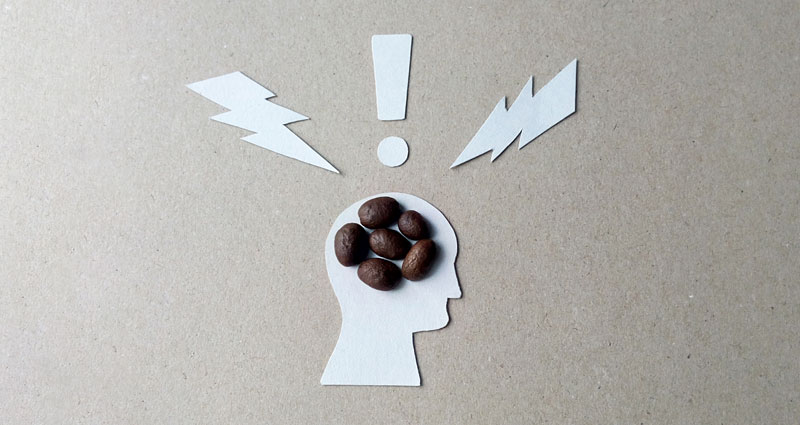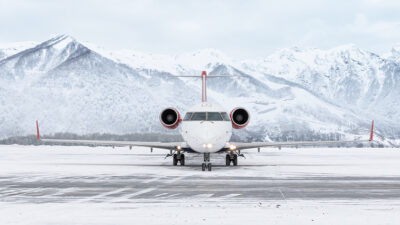Caffeine Will Enable Me To Power Through My Day. Right?

Worrying about the current public health crisis and how it affects our jobs, our lives and our health is something that all of us have experienced to some degree over the past year. Unsurprisingly, an increasing number of people have been reporting sleep disturbances since the COVID-19 pandemic began.
Chronic stress is one culprit. As higher levels of adrenaline and cortisol course through our body, our heart rate and blood pressure increase, making it harder to get to sleep. On top of this natural flight-or-fight response to stress, pandemic lifestyle factors are also to blame. There are new burdens of looking after family members who may have fallen ill, or simply putting in more hours at work to fill in for absent co-workers. And for those that are still working from home, elevated screen time means more blue light exposure—a known cause of suppressing the body’s release of the sleep hormone melatonin.
Poor Sleep Takes Its Toll
Shaving just 30 minutes of sleep off of each night quickly adds up to a significant sleep debt, a known fatigue risk factor. Not getting enough sleep can also lower sex drive, weaken the immune system and contribute to weight gain. But probably the most familiar consequence of insufficient sleep is that feeling of brain fog—just not being on your “A game.”
Obviously, the best solution is more sleep. But when getting enough sleep is elusive, we tend to look for alternative means of combating clouded consciousness. Admirably, some people make radical changes to their diet, such as going carb-free. Others invest in sleep aids to make the most of the precious hours of time in bed. The majority, though, look for a quick fix in the form of stimulants, especially caffeine. The U.S. Food and Drug Association (FDA) says that about 80% of U.S. adults consume some form of caffeine each day.
How Does Caffeine Work?
Caffeine is a natural substance commonly found in tea, coffee and cacao plants. It works by stimulating the central nervous system. Its main effect is on the brain, where caffeine connects to special receptor cells and blocks their ability to process adenosine, a neurotransmitter. Adenosine relaxes the brain and makes us feel tired, which is why stopping this molecule from doing its job prolongs wakefulness.
Caffeine also increases adrenaline levels and has been shown to stimulate the activity of dopamine and norepinephrine in the brain. This combination of neurotransmitters stimulates arousal, alertness and focus.
The effects of caffeine vary widely depending on individual sensitivities to the compound and how fast it gets metabolized. Generally, the alertness boost starts about 20 minutes after consuming caffeine and may last for about an hour. The effect is weaker among people who are accustomed to drinking coffee or tea. Cigarette smokers metabolize caffeine twice as fast as non-smokers. Older people and those with certain medical conditions metabolize caffeine more slowly.
Caffeine in Aviation
It’s no secret that caffeine and flying go hand in hand—the irregular hours and inconsistent schedules of air operations make caffeine a go-to stimulant for many flight crew members. It is important that we use caffeine strategically, though. At best, caffeine will give you a temporary boost in alertness. Its effects are subject to the law of diminishing returns and soon wear off. Meanwhile, landing procedures—a part of the operation requiring sharp attention—are still ahead in the flight schedule.
Why not just drink another caffeinated beverage when your alertness sags again? It depends on how much you’ve already had during the day. Consuming too much caffeine can be dangerous. According to the FDA, up to 400 milligrams of caffeine a day—about four or five cups of coffee—is the limit for healthy adults. Excess caffeine consumption can lead to nervousness, anxiety and mild involuntary trembling. These symptoms can adversely affect your performance as a flight crew member, as your job demands a high degree of precision and attention to detail.
From Personal Countermeasures to Risk Controls
At Pulsar Informatics, we classify caffeine as a personal countermeasure and advise our customers to use it strategically. Personal countermeasures are behavioural decisions made by individual flight crew members to help mitigate the effects of fatigue. In addition to caffeine, other examples of personal countermeasures include light exercise, proper hydration and healthy nutrition.
The effectiveness of a personal countermeasure will vary from person to person and even with the time of day. For this reason, personal countermeasures should not solely be relied upon as fatigue risk mitigations. At best, they may complement risk controls implemented as part of a robust and evidence-based fatigue risk management program.
There is no better risk control than restorative sleep. But is the sleep that you and your fellow crew members are getting as of late fully restorative? The economy is gradually reopening. Before it gets really busy, now may be a good time to think about introducing a rigorous set of policies, procedures and risk controls to help deliver the fatigue risk management posture that your flight operation’s safety commitment demands. Contact Pulsar Informatics to find out how easy it is to get started.

Pulsar Informatics is an IS-BAO I3SA certified company specializing in systems that help organizations reduce fatigue-related risk and achieve peak performance. Fleet Insight enables safety managers and schedulers to proactively evaluate fatigue across their entire operation’s schedule and formulate mitigation strategies. Fatigue Meter Pro Planner is used by pilots, flight attendants, and maintenance personnel to evaluate their individual flight and duty schedule.
http://www.pulsarinformatics.com
© 2025 Pulsar Informatics, Inc.. All Rights Reserved.
Next ArticleRelated Posts

Mitigating Risk – Amidst the Chaos
There have been more high-profile aviation accidents in the last few months than in the last few decades. As we mourn those we have lost and aim not to make assumptions before final reports are completed, we must focus, personally and professionally, on assessing the risk of something similar happening within our aviation enterprises.

Let’s Get Personal (About Risk)
Aviation loves to talk about risk management. Insurance companies, manufacturers, and organizations all fully embrace the concept and know that to make it work on the line, we must get people at all levels and from all functional areas to embrace it. Tools such as the Flight Risk Assessment Tool (FRAT) are noble attempts, but at the core of it all lies the simple fact that people, as individuals, view risk differently.

